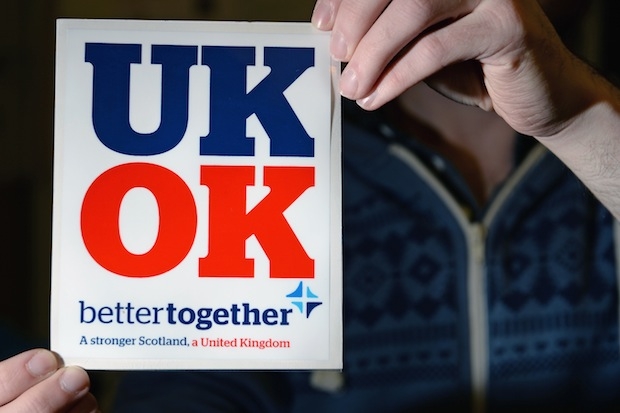I took part in a documentary about Scottishness a few weeks ago, and it wasn’t bad at all. I mused, mainly, on my own border-hopping, fretful-about-independence Scottish-Britishness, and a decent number of people got in touch afterwards to say I’d been speaking for them, too. Others were more cross, but interestingly so. One thing about the whole experience bugs me, though. That was the way they had me sit in a swanky Scottish restaurant in Belgravia and made out like I belonged there.
It’s not that you don’t get Scots in Belgravia. Most will probably own castles back in Scotland, too, though. When they move to Belgravia, they do so in a manner similar to the way that orthodox Jews move to Israel; to finally be among their own. This is not my world. I live opposite a mosque in Haringey and moved to London for the opposite reason — not to join my people, but to leave them. Raised in comfortable, middle-class Edinburgh (where the castle is lovely, but alas not mine), I wanted a life with a few more jagged edges.
I can see why producers went with the Belgravia thing, though. One great oddity of modern Scotland is the near-invisibility of the true middle class. By which, of course, I don’t really mean the people in the middle, like Ed Miliband would, but something more like the non-landed posh. The professionals. England’s equivalents are noisy, boisterous and sharp-elbowed; confident that they set the template of what everybody else should hope to be. Frankly, they act like they own the place.
Not so in Scotland. Here they skulk, despite being everywhere. Edinburgh is a city in which a staggering one in four children are educated in the independent sector. Honestly, look it up. The Merchant Company, the Faculty of Advocates, the Edinburgh Festival; these pillars of the Scottish establishment are still stuffed full of such people. Yet in politics and indeed in public at all, they have picked up a habit of either keeping their heads down or pretending to be something else. Search for their overt contribution to the current debate on Scottish independence and you will search in vain.
This is not a new phenomenon. A decade and a half ago, the Glaswegian poet and critic Christopher Whyte used the phrase ‘textual invisibility’ to describe the near absence of the Scottish middle classes from contemporary Scottish literature. And it’s true. From Alasdair Gray’s Lanark to Irvine Welsh’s Trainspotting and a thousand points between, they simply aren’t there, except very occasionally as terrible wankers. And yet it is they who read contemporary Scottish literature; who buy it and consume it. It’s not even a defeat, this, because no battle has ever been fought. It’s a pre-emptive retreat. It’s a cringe.
It won’t do. Not any more. You could argue, I’m sure, that one of the most positive aspects of Scottish devolution has been a populist reclamation of the body politic from an establishment with split priorities. That’s all well and good, but actual independence is a different matter. The Scottish middle classes aren’t really a tribe. They could not drift easily into exile, maybe like Uganda’s Asians. They’re exactly like everybody else, but with better jobs. They include, by definition, many of the most successful, creative and driven people that Scotland has to offer.
And they’ll vote no. Not to a man, perhaps, but near as dammit. You get flashes sometimes from their young, who have not yet learned their place. Strathallan, one of Scotland’s most expensive public schools (and costing, as such, slightly less than a London day crèche) recently hosted Brian Taylor’s BBC Scotland debate on the forthcoming independence referendum. The pupils were against, by a margin of 197 to three. Afterwards, some of them had to apologise for getting into an online slanging match with Pete Wishart, the local SNP MP. So there’s passion there.
Yet from their parents and elder siblings, not a peep. They know what they think. They have just grown accustomed, insidiously, to avoiding stating it. Granted, there may be a downside to their turning up the volume, for there are doubtless nationalist factions who would love a referendum on independence to become one on class. But for God’s sake, isn’t that the sort of self-loathing squirming that got us into this mess in the first place? These are the missing voices from the independence debate. This is the source of the No campaign’s terrible insipid bloodlessness, and its palpable lack of fire. It’s the cowed, awkward, embarrassed silence of the very people with the greatest stake.
Yes, you may have divided loyalties, to Scottishness and to Britishness, too. But that’s what Unionism is by definition and there ought to be no shame in it. And yes, you may turn into Welsh’s Begbie after your ninth pint of Bellhaven’s Eighty, or at the very least have an identity tightly bound up with the feeling that you ought to. But even sober, by God, you’re as much a Scot as Sir Walter.
It’s too late for me. I’ve gone. But for you, there is still time. Among the scions of George Watson’s, George Heriot’s, St George’s and other Georges I’ve forgotten, let the cry go up; from the spires of Loretto, Glenalmond, Fettes and Gordonstoun; at Academies Glasgow and Edinburgh, and Morrisons and Dollar and Hutchesons and everywhere else. Your horizons may be broad and your accent may not be, but that matters not one whit. Scotland is your country, too. So pull your damn fingers out, and man the hell up before it’s too late.







Comments